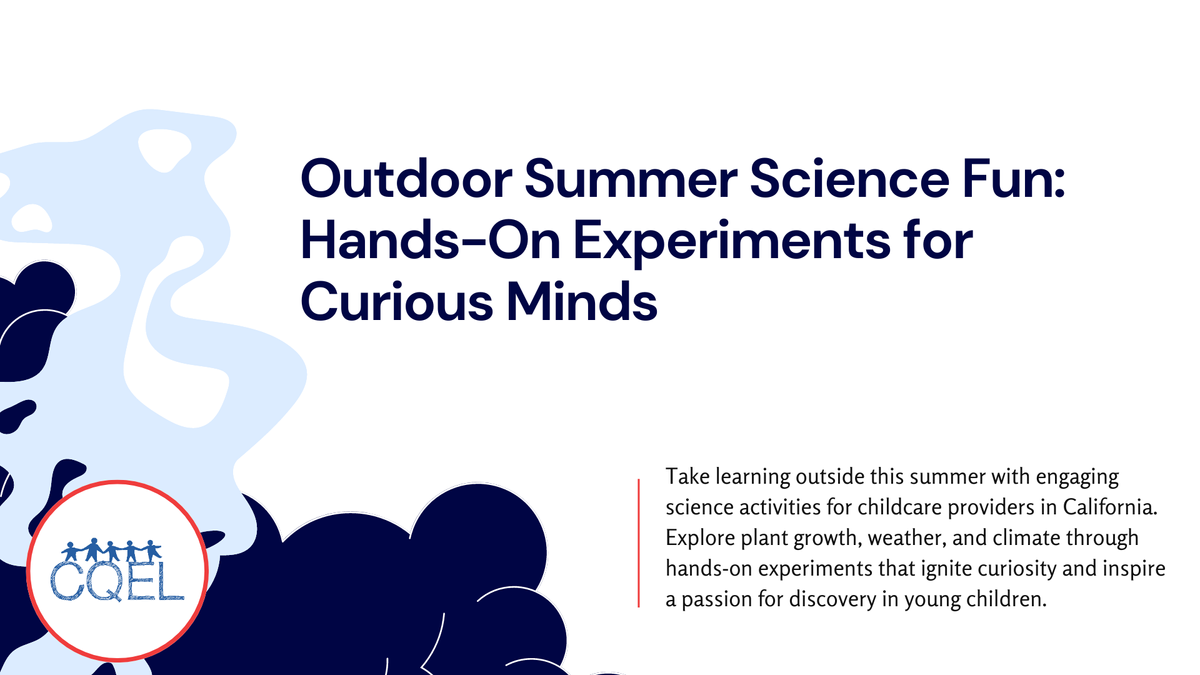Outdoor Summer Science Fun: Hands-On Experiments for Curious Minds
Embrace the summer season with outdoor science exploration for aspiring childcare providers in California. Discover hands-on activities that engage young minds in plant growth, weather, and climate, fostering curiosity and a lifelong love for learning.

As the warm breeze of summer fills the air, there's no better time to take learning beyond the classroom walls and into the great outdoors. For aspiring childcare providers in California, harnessing the power of outdoor science exploration offers a wealth of opportunities to engage young minds in hands-on experiments and discoveries. From investigating plant growth to exploring the mysteries of weather and climate, outdoor summer science activities ignite curiosity and foster a lifelong love for learning.
Embracing outdoor learning is more than just a seasonal excursion – it's a pedagogical approach that nurtures holistic child development. By immersing children in natural environments, childcare providers can cultivate connections with the natural world, promoting environmental stewardship and fostering a sense of wonder. Additionally, outdoor science exploration encourages physical activity and well-being, offering children a dynamic and multisensory learning experience that enhances their cognitive, emotional, and social development.
Planning outdoor science activities requires careful consideration and preparation to ensure a safe and enriching experience for all participants. Selecting suitable outdoor locations, such as local parks, nature reserves, or even the childcare center's own outdoor play area, is the first step in creating a conducive learning environment. Prioritizing safety measures and supervision is essential, as is gathering materials and resources needed for the planned experiments and investigations.
One of the key benefits of outdoor summer science activities is the opportunity to engage children in hands-on experiments that stimulate their curiosity and critical thinking skills. Exploring plant growth and gardening, for example, allows children to witness the wonders of nature firsthand as they plant seeds, observe germination, and nurture growing plants. Similarly, investigating weather and climate phenomena through DIY weather stations or cloud observation activities encourages children to become keen observers of their surroundings and develop a deeper understanding of the natural world.
Facilitating inquiry-based learning outdoors involves creating opportunities for children to ask questions, make observations, and explore solutions collaboratively. Encouraging open-ended exploration and experimentation fosters creativity and problem-solving skills, empowering children to take ownership of their learning journey. By fostering a supportive and inquiry-driven learning environment, childcare providers can inspire children to become lifelong learners with a passion for discovery.
Incorporating technology into outdoor science exploration can further enhance children's learning experiences and extend their understanding of scientific concepts. Utilizing educational apps and online resources allows children to access a wealth of information and interactive simulations that complement their outdoor discoveries. However, it's important to strike a balance between screen time and nature immersion, ensuring that technology serves as a tool for learning rather than a distraction from the outdoor experience.
Adapting outdoor science activities to suit different age groups requires tailoring experiments and investigations to meet the developmental needs and interests of each child. For toddlers and preschoolers, simple sensory experiences and exploratory activities provide opportunities for hands-on learning and discovery. School-age children, on the other hand, may engage with more complex scientific concepts and experiments, such as building simple machines or exploring energy transfer through physics challenges.
Maximizing learning opportunities through reflection and extension activities ensures that children derive lasting benefits from their outdoor science experiences. Encouraging children to journal their observations, thoughts, and questions fosters metacognitive skills and deepens their understanding of scientific concepts. Additionally, connecting outdoor experiences to classroom learning and engaging families in outdoor science exploration extends the learning beyond the childcare setting, creating a continuum of discovery and inquiry for children and their caregivers.
In the pursuit of outdoor science exploration, childcare providers must also consider inclusivity and accessibility, ensuring that all children have the opportunity to participate and thrive. By recognizing and accommodating diverse learning styles and needs, childcare providers can create a welcoming and inclusive learning environment where every child feels valued and supported. Cultivating a culture of equity and belonging in outdoor learning spaces promotes social justice and empowers children to embrace their unique identities and perspectives.
For childcare providers in California, navigating the legal and safety considerations of outdoor science activities is essential to ensure compliance with regulations and mitigate potential risks. Seeking guidance from reputable organizations like the Californians for Quality Early Learning (CQEL) can provide invaluable support and resources to help childcare program owners and directors navigate the complexities of outdoor learning. By prioritizing safety, compliance, and best practices, childcare providers can create a safe and enriching outdoor environment where children can explore, discover, and thrive.
In conclusion, outdoor summer science activities offer a dynamic and immersive learning experience that sparks curiosity, fosters inquiry, and promotes holistic child development. By embracing outdoor learning, childcare providers in California can inspire a love for science and nature that lasts a lifetime, equipping children with the knowledge, skills, and confidence to become lifelong learners and stewards of the environment.
Resources:
